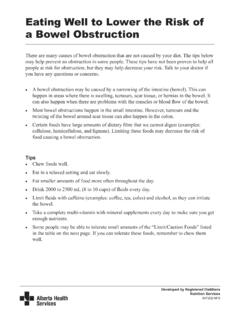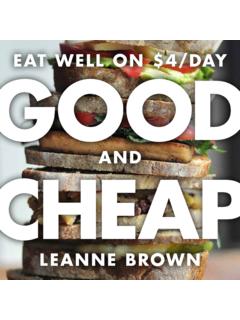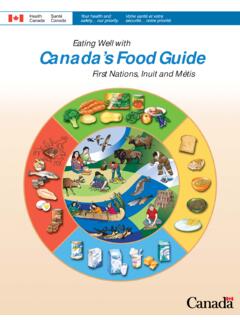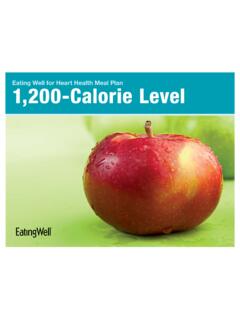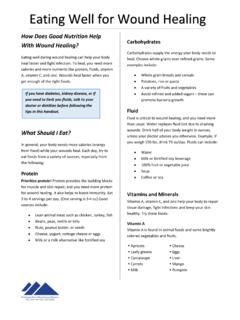Transcription of Eating for Gastroparesis - Living (Well!) with ...
1 Eating for Gastroparesis : Guidelines, Tips & Recipes By Crystal Zaborowski Saltrelli Patient-Expert & Certified Health Counselor Copyright 2010 Crystal Zaborowski Saltrelli All Rights Reserved Welcome First, I'd like to both thank and congratulate you for downloading this book. Being proactive and educating yourself is one of the most important aspects of managing Gastroparesis . I was diagnosed with idiopathic Gastroparesis over six years ago. Since then, I've become a Certified Health Counselor helping others develop dietary and lifestyle strategies to better manage the disorder. I know from both personal and professional experience exactly how difficult it can be for Gastroparesis patients to figure out what and how to eat.
2 Whether you have Gastroparesis yourself or you're caring for someone who does, I truly hope that the information and recipes in this book help to alleviate the confusion and uncertainty that often surrounds the Gastroparesis diet.. As you read, please keep in mind I am not a physician. What I'm providing are guidelines and suggestions, not medical advice. Dietary tolerances, severity of symptoms, and nutritional considerations vary greatly among Gastroparesis patients. Please consult your physician if you have any questions as to whether or not a particular suggestion is appropriate for you. Part I: The Guidelines In this section, we'll cover the basic guidelines of a Gastroparesis (GP).
3 Diet. As you read, remember that you know your body, symptoms and boundaries better than anyone else and some of the suggestions may not be appropriate for you. Also keep in mind that dietary modifications are a symptom- management tool rather than a treatment for the disorder. Eating foods that are not considered Gastroparesis -friendly (GP-friendly). may make you feel worse in the short-term but it's not likely to make the disorder worse overall. Likewise, following a Gastroparesis -friendly diet won't address the underlying cause of the disorder, but may significantly alleviate day- to-day symptoms. While this is especially true for those with mild to moderate Gastroparesis , dietary modifications in conjunction with other medical treatment can provide relief for severe GP, as well .
4 No studies have been conducted to determine which specific foods or diets alleviate or exacerbate symptoms in patients with Gastroparesis (GPers). The standard recommendations are based on the basic science of digestion, as well as the experience and observations of patients and clinicians over time. Eating for Gastroparesis 6. The Guidelines 1. Eat several small meals throughout the day. 2. Follow a low-fat diet. 3. Reduce the total amount of fiber in your diet. 4. Limit food with indigestible parts. 5. Supplement with nutrient-rich liquids. 6. Modify the guidelines according to your symptoms. 7. Frequently Asked Question What does Gastroparesis Friendly mean?
5 Throughout this book, you'll see the term GP-friendly . used to describe various foods and recipes. When I call something GP-friendly, I'm indicating that: (a) It follows the Gastroparesis diet guidelines. In other words, it's relatively low in fat, low in fiber, and easy to digest. (b) It doesn't contain any nuts, seeds, skins, hulls, peels, dried fruit, raw vegetables, or indigestible parts. (c) It's likely to be well -tolerated by many GPers. Anything that meets these criteria is unlikely to cause any serious problems. The catch? There are things that I deem GP-friendly that don't agree with me personally. Likewise, there may be some that don't agree with you.
6 As I tell my clients, GP-friendly doesn't always mean <your name here>-friendly. While I know that can be frustrating and it's tempting to stick to a handful of safe foods, I. encourage you to keep trying things particularly those that are GP-friendly for the sake of your overall nutrition, as well as your sanity! Eating for Gastroparesis 8. Modify the Guidelines According to Your Symptoms I'm starting with the last guideline because it's the most important and often the most frustrating. While I wish that I could tell you exactly what to eat, the unfortunate truth is this: there is no single Gastroparesis diet.. In fact, you'd probably be hard-pressed to find a single food that's well - tolerated by all GPers.
7 Why do tolerances vary so much from patient to patient? It's hard to say. Perhaps it has to do with the wide-variety of underlying causes. Sure, we all have delayed gastric emptying but the reason the emptying is delayed is often very different. There are also a variety of symptoms associated with Gastroparesis , including nausea, vomiting, pain, fullness, reflux and bloating. Not every Gastroparesis patient experiences the same symptoms to the same degree. In addition, the actual rate at which the stomach empties varies greatly among those diagnosed with Gastroparesis . (Interestingly, the severity of symptoms doesn't always correlate to the degree of delayed gastric emptying.)
8 What's more, some GPers have other digestive issues, like lactose intolerance, fructose malabsorption, or food allergies. Given all of the variables, it makes sense that the dietary strategies for managing Gastroparesis would be different from person to person. The issue is further complicated by the fact that symptoms tend to ebb and flow. Even individual tolerances may vary from week to week or day to day. Whether or not a particular food or meal causes symptoms can depend on portion size, how quickly or slowly it's eaten, and what was eaten earlier that day or even the day before. The bottom line is this: there is no one-size-fits-all diet for Gastroparesis .
9 There are only a set of guidelines from which you can develop your Gastroparesis diet. Careful trial-and-error within the boundaries of the general guidelines is the only way to figure out exactly what you can and cannot tolerate. Throughout the remainder of the book, I'll provide you with ideas, suggestions and guidance to help you do just that. 9. Frequently Asked Question How do I get past the fear of experimenting? First, know that you're not alone. Many Gastroparesis patients become fearful of straying from their safe foods or even of Eating in general. If you're experiencing these feelings, it's important to talk with a professional who can help you work through them.
10 Limiting your food intake unnecessarily will only compromise your overall health and nutrition. Another thing that may help is to keep a food journal. This will allow you to see on paper what actually happens when you try new foods. Remember that even if a particular food causes temporary symptoms, it won't make the Gastroparesis any more severe overall. Quick Tip Keep a Journal If I could only offer you one tip, it would be to keep a food journal. There is no better way to figure out what does and does not work for you than by consistently keeping of track of what you eat and how you feel. It needn't be time-consuming. You don't need to track calories or other nutritional information.
